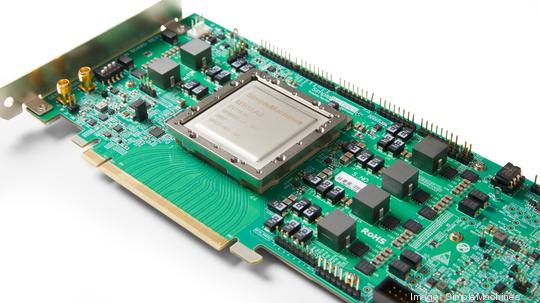
A startup company created by a University of Wisconsin-Madison computer science professor is gearing up to sell its high-performance, programmable computer chip, which the company's founder said can crunch data at higher capacities for data centers, smartphones and even intelligent cameras.
The chip, called Mozart, was developed over a 10-year period by UW-Madison professor Karu Sankaralingam, the founder and CEO of SimpleMachines, along with research students at UW-Madison.
Sankaralingam started developing the chip after noticing smartphones and laptops were not getting better. Through his research, he determined computer chips could be made smaller, but if built the same way, would not have better performance, meaning they couldn't yield faster results.
Sankaralingam determined data would still be generated, but users would need more computation. The chip was designed to be programmable and adaptable, meaning users can insert models and frameworks on to the chip to allow it to run faster. Examples include recommendation engines, speech and language processing, and image detection, all of which can run simultaneously.

Sankaralingam said it took his silicon team under a week from having the chip in-house to running applications on the device, "putting us on the fast track to take our first silicon to production.”
Silicon is a material used to make computer chips.
SimpleMachines, which is now based in San Jose, California, with 50 employees in the U.S. and India, is primarily a business-to-business company, selling the chip to businesses that need faster data computation. The company has fewer than 10 employees in Wisconsin, including Sankaralingam, who is still a professor at UW-Madison.
Financial institutions, insurance companies and telecommunication companies can use the chip for predictive analytics and pricing, more or less a tool to help them serve their customers more efficiently, Sankaralingam said. Other use cases for the chip include drug discovery, digital marketing and media streaming services.
Sales are expected to begin in the first and second quarters of 2021, Sankaralingam said. Using market research, the company said the global artificial intelligence chip market will reach $91 billion by 2025.
Sankaralingam has high revenue expectations for the company, which has already raised roughly $20 million from private investors since being founded in 2017, according to Crunchbase. Some of the current investors include the Wisconsin Alumni Research Foundation (WARF), the patent and licensing organization of UW-Madison which also manages profitable research for the university, and Milwaukee-based BrightStar Wisconsin Foundation, Sankaralingam said.
“As fast, flexible computing becomes more accessible, AI will be used by more industries for more applications more frequently, so chip design must evolve accordingly,” Sankaralingam said. “We are disrupting the next wave of computing with our breakthrough technology and are excited about the market opportunity, especially for AI chips along the power spectrum.”








